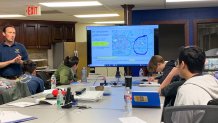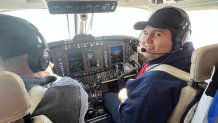With summer travel demand surging past pre-pandemic levels, passengers are dealing with cancellations and delays.
It's made worse by the ongoing pilot shortage and staffing crisis.
Major airlines are in full recruitment mode and local programs might be the key to bringing new talent into the industry.
Filling the Gap
Get DFW local news, weather forecasts and entertainment stories to your inbox. Sign up for NBC DFW newsletters.
There was talk of a pilot shortage even before the pandemic.
But when air travel plunged in 2020, it forced so many pilots into furloughs and early retirement. Now there's this huge gap to fill for years to come.
According to database company Statista, North American will be in need of about 130,000 pilots in the next 20 years.
Local
The latest news from around North Texas.
Programs that help encourage interest in aviation might be a source for the industry to tap into for new talent.
Rising Aviation High School in Addison is literally a high school for students who want to fly straight into a career in the aviation industry.
Classes are geared toward training to not only be a pilot but to also follow career paths in being a mechanic, engineer, and working for dispatch or air traffic control.
"This is a brand new program. There's no other program around that we know of, especially here in the Texas area, that is aviation centric. It's housed in an airport where students are immersed from the moment they arrive to the moment they leave," said Principal and lead flight instructor Brent Fitzgerald.
Fitzgerald said with a staffing crisis in the aviation industry and beyond, programs like this one are crucial in attracting new pilots and other workers that are so desperately needed.
"Because I think to really solve this the whole shortage of pilots and everybody else in aviation industry, we need to get at the youth, help mold them and show them the pathway. So we thought it was a huge advantage to go at the high school level and give them a quality education, an accelerated education," Fitzgerald said.
Students have access to a flight simulator to learn everything they need about piloting through the virtual space before sitting in a real cockpit.
They also take courses to learn about reading instruments, weather patterns and even flying drones. Basic courses for high school are still covered alongside the focused aviation classes.

"Practicing on a flight simulator before your lesson has a great advantage. Just learning the muscle memory, the 'flows' as we call it -- going through pressing the different buttons and knowing that configuration. It does save a lot of time because flight training is expensive. So any way that we can cut back on the cost is a huge benefit," said Fitzgerald. "There's a lot to learn in aviation. It takes a lot of study. But the thing is, most people are very passionate about it whether you know a lot or not going into it."
The school is located right next to Addison Airport so the students also have access to work with real planes, including one of the high school's own aircraft.
"We're showing them the opportunities, giving them that head start. We believe that it will help out in funneling more prospective pilots or aircraft maintenance technicians into the industry," Fitzgerald said.

By the time some students graduate, Fitzgerald said they can have flight time experience, a private pilot's license, and a drone pilot license.
The private school just wrapped up its first class of students this past school year, with dozens more expected next year.
Their first ever graduate is already proving himself. He already has a job with Southwest Airlines and has a scholarship opportunity this summer with the EAA AirVenture air show in Oshkosh, Wisconsin.
"Sitting in the Dallas-Fort Worth area, we have such a great pool of potential candidates. So reaching out at an earlier age finding these candidates and getting them trained, getting prepared is crucial," said Fitzgerald.
Major Recruiting
It's not just the pandemic that has led to an overall shortage in pilots.
Other reasons for the shortage include the expensive application process. Pilots are responsible for obtaining their own credentials through the Federal Aviation Administration and must pay for their own training.
While there are pilot career programs through major carriers and scholarship opportunities at flight schools, it can be highly competitive and extremely difficult to stay the course and pay for the training needed to meet FAA requirements.
The FAA currently requires pilots to have at least 1,500 flight hours before they can work at an airline, which must be obtained officially through accredited programs and training facilities.
It can cost over $100,000 for flight training and education but if the pilot stays committed through working for a major airline, they can eventually make upwards of $250,000 a year or more.
"It is expensive to get into the training. There's a 1,500 hour rule to get to the airlines and so again, when you have an advantage of starting earlier that helps," said Fitzgerald.
Throughout the pandemic, local airlines have been on a hiring and recruitment frenzy.
A representative with Southwest Airlines told NBC 5 they are on track to hire about 10,000 new employees this year including 1,200 hundred pilots.
SWA said in a statement that it is not experiencing a pilot shortage. However, previous reports have stated that the airlines had to cut flights this summer due to staffing shortages, including pilots.
"Southwest appreciates being an employer of choice for pilots, and the airline experiences strong interest for First Officer positions. Currently, Southwest is not experiencing a shortage of pilots," said SWA in the statement to NBC 5. "In fact, Southwest received approximately 3,000 applications for the 120 First Officer positions hired in 2021. We are on track to hire about 1,200 pilots in 2022."
An American Airlines representative said in a statement that their company has a goal of hiring 180 pilots per month this year and has already brought on 1,000 so far. Last year, American said it had set out to hire 350 pilots and exceeded that goal by hiring 575.
But the big issue lies with regional carriers. That’s usually a breeding ground for pilots who often end up flowing through to major carriers.
To get there, those young pilots had to invest a lot of money in training and requirements.
However, the regional airlines have been criticized for not paying well.
Just this week, two American Airlines-owned regional carriers – Envoy Air and Piedmont – agreed to hike pilot pay by 50% through August 2024 to help retain those pilots and keep flights running. The increases would make the pilots the highest paid of the U.S. regional airlines, ramping up pressure on other carriers to follow suit.
"Attrition of the regional pilots, particularly the captains, has really spiked to the point where we're not able to put our fleet in the air," Piedmont CEO Eric Morgan told CNBC.
The airline, based in Salisbury, Maryland, has been losing about 25 pilots a month to American's mainline operation and has fallen short of its goal to hire around 40 pilots each month. It flies 50-seat Embraer ERJ-145s for American, usually between smaller cities, but hasn't been able to operate 10 of its roughly 60 planes, Morgan said.
Experts hope the pay hike will help regional pilots stay the course as they work their experience level up to flying for the major carriers.
American and several other companies are also giving potential pilots who are still in flight schools up to six figures in promised grants and bonuses if they sign on as a regional pilot and stay through captain status through the major carrier.
Starting Young
Programs like Rising Aviation are becoming more popular in recent years, with similar schools opening up across the country at both the high school and collegiate level.
Some public school districts in North Texas also have their own aviation programs.
Dallas ISD has a magnet program for high school students that teaches aviation courses. Dunbar High School within Fort Worth ISD has an aviation lab that helps students obtain their drone pilot license, learn about jobs in aviation and earn dual credit through Tarrant County College.
"When we start young, we get a student that solos at 16 and gets their private pilot's certificate at 17. They're already able to start working on their advanced certificates and they're already able to start building their flight time to get to the airlines,” said Fitzgerald. “So that at 23, they can already go out and have a fantastic career with a high rate of return on their investment.”
As a private school, Rising Aviation High School charges about $500 a month for tuition. However, the school is looking for grants and assistance as it grows, with hopes of expanding into other parts of the metroplex so that more students can have the ease and opportunity to attend.
"We want students who are have a curiosity in aviation. We're not expecting them to come in as experts by any means," said Fitzgerald. "But we feel that it's not being pushed enough in schools to show that this high demand, high skill set, high wage opportunity in careers are there and how to get to them from point A to point B."
If you are interested in the program at Rising Aviation High School, there's an information session for parents and students happening on Thursday, June 23 at their campus. Click here to RSVP.



